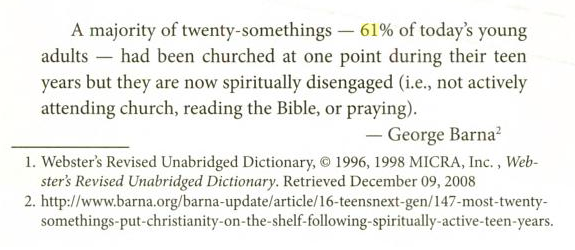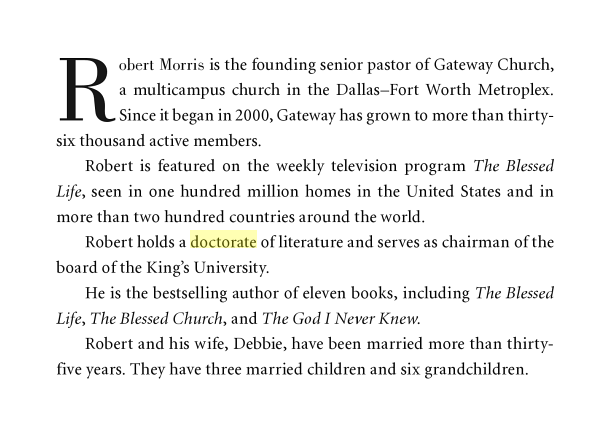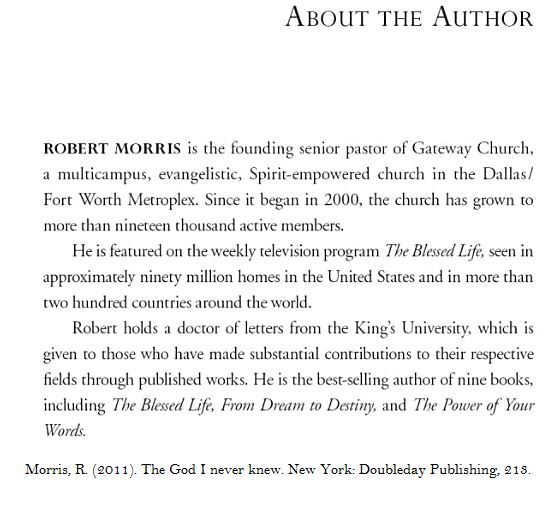Reading the book U-Turn: Restoring America to the Strength of its Roots is a frustrating experience. For the most part, authors George Barna and David Barton labor to make the case that America needs to turn back to God in order to avoid judgment. I have been hearing these appeals since I was in high school (“If my people who are called by my name…”). In all of them, the speakers or authors have warned that America had become so bad that judgment was just around the corner.
As a part of their efforts to make a doomsday scenario believable, the authors recruit lots of statistics and surveys. This is understandable since George Barna is a pollster. However, what is puzzling is Barna’s and Barton’s failure to use the most recent work of the Barna Group. To illustrate, here is what Barna and Barton say about students, their faith and college attendance.
Clearly many parents of these younger adults failed to transmit to them a vibrant and useful faith, which was largely because the parents themselves lacked a vibrant and useful faith. As proof of this, although eight out of ten Americans claim to be Christians, only 9 percent of these Christians agree with six of the most elementary nonnegotiables of the Christian faith.* So poorly equipped are Christian young people by their minimally believing Christian parents that 61 percent of Christian youth who now attend college abandon their faith as a result.79 (Barna, George; Barton, David (2014-10-21). U-Turn: Restoring America to the Strength of its Roots (pp. 100-101). Charisma House. Kindle Edition.)
Barna and Barton take a dim view of Christian parents and higher education and blame them for what they say is a generation falling away from Christianity. The footnote for this paragraph leads to a book by co-authored by Ken Ham. In that book, Already Gone, Ham and his co-authors cite a 2006 article on the Barna Group website:

To me, it seems odd that Barna would cite someone who cites him. Why not just cite your own work directly? More puzzling, perhaps, is the fact that Barna did not cite the recent research group bearing his name.* Furthermore, in U-Turn, he makes the situation sounds worse than it is.
The 2006 Barna said that 61% were “spiritually disengaged.” The 2014 Barna says 61% of youth “abandon their faith.” As the 2011 Barna Group article will teach us, being spiritually disengaged isn’t quite the same thing as abandonment of one’s faith.
In a 2011 article on the Barna Group website, five myths are identified about youth leaving church. While it isn’t the last word on the subject, it is a reasonable article which breaks down the religious development of several groups of young people. Barna and Barton should have used it. People considering this book should be aware that Barna didn’t use the research he helped start in 2007.
The Barna Group in 2011 rebuts George Barna of 2014 (which is really an amplification of Barna of 2006). The 2014 Barna says “61 percent of Christian youth who attend college abandon their faith as a result.” The 2011 Barna Group said that statement contains two myths. They are:
Myth 1: Most people lose their faith when they leave high school.
Reality: There has been considerable attention paid to the so-called loss of faith that happens between high school and early adulthood. Some have estimated this dropout in alarming terms, estimating that a large majority of young Christians will lose their faith. The reality is more nuanced. In general, there are three distinct patterns of loss: prodigals, nomads, and exiles.
Compare what Barna says in his new book with what an article on the Barna Group website said in 2011. It seems ironic that he has become one of the people who say a large majority of young Christians will “lose their faith.” As the 2011 article correctly notes, the reality is more nuanced. If you want nuance, skip U-Turn and read the Barna Group’s website.
The second myth contained in Barna of 2014 relates to the impact of college. Barna and Barton say 61% abandon their faith “as a result” of college. On the contrary, the Barna Group in 2011, said:
Myth 3: College experiences are the key factor that cause people to drop out.
Reality: College certainly plays a role in young Christians’ spiritual journeys, but it is not necessarily the ‘faith killer’ many assume. College experiences, particularly in public universities, can be neutral or even adversarial to faith. However, it is too simplistic to blame college for today’s young church dropouts. As evidence, many young Christians dissociate from their church upbringing well before they reach a college environment; in fact, many are emotionally disconnected from church before their 16th birthday.
Mr. Barna, I didn’t say it; the group you founded did. It is too simplistic to blame changes in faith on higher education. And yet, that is exactly what you and David Barton do in your book. I recognize you also blame parents, but let me go out of a limb to say I think that is too simplistic too.
There are more instances where data are used incorrectly to yield a misleading conclusion. There are too many problems with this book to address them all but I intend to get to some of them as I am able. For more, see also here and here.
*The original post indicated that Barna was affiliated with the Barna Group. He sold it in 2009 to David Kinnaman.


